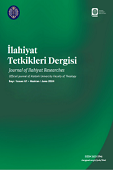Consumer Boycotts and Jurisprudential Challenges Related to Identifying Their Legal Cause (‘Illah)
Consumer Boycotts and Jurisprudential Challenges Related to Identifying Their Legal Cause (‘Illah)
Author(s): Ozat ShamshiyevSubject(s): Marketing / Advertising, Socio-Economic Research, Sociology of Law, Sharia Law
Published by: Atatürk Üniversitesi İlahiyat Fakültesi
Keywords: Islamic Law; Consumer Boycott; Fiqh Analysis; Jurisprudential Challenges; The Ratio Legis (‘illah);
Summary/Abstract: Recently, consumer boycott has been used as an economic weapon and a tool of passive resistance. There are several dimensions to consumer boycott, which serves as a means for Muslim communities to assert their will and to make their voices heard. This study primarily examines the legal (fiqhi) justifications for consumer boycott. The main objective of the study is to identify the reasons (causes) that lead Muslims to engage in consumer boycott. In addition, a secondary objective of our study is to present the problems that may arise in issuing fatwas in relation to the identified causes and abiding by the consequences of these causes. The qualitative analysis method was used to achieve the objective of the study. This analysis was largely carried out using literature and content analysis techniques. Classical jurisprudential principles (uṣūl al-fiqh), principles of issuing fatwas (uṣūl al-iftā), consideration of consequences (i‛tibār al-ma’ālāt) and principles of Islamic governance (al-siyāsah al-shar‛iyyah) were also highlighted in the research methodology. According to our findings, the concept of boycott is not commonly found in classical jurisprudential sources. The rulings on boycott are more implicitly addressed in issues regulating commercial relations with non-Muslims. As far as contemporary literature is concerned, there are numerous studies on Muslim consumer boycott from different perspectives. However, there is a gap in the literature regarding the identification of the cause of boycott. As a result, four causes of boycott have been identified: “disrespect for Muslim dignity”, “insulting religious values”, “supporting the enemy in a state of war with Muslims”, and “political interests and general welfare of Muslims”. Some issues related to the practical application of these grounds are also discussed. In addition, the author raises the question of whether threatening the ḥalâl and healthy nutrition of Muslim communities is a reason for boycott and suggests it as a topic for further research.
Journal: İlahiyat Tetkikleri Dergisi
- Issue Year: 2024
- Issue No: 61
- Page Range: 179-193
- Page Count: 15
- Language: English

